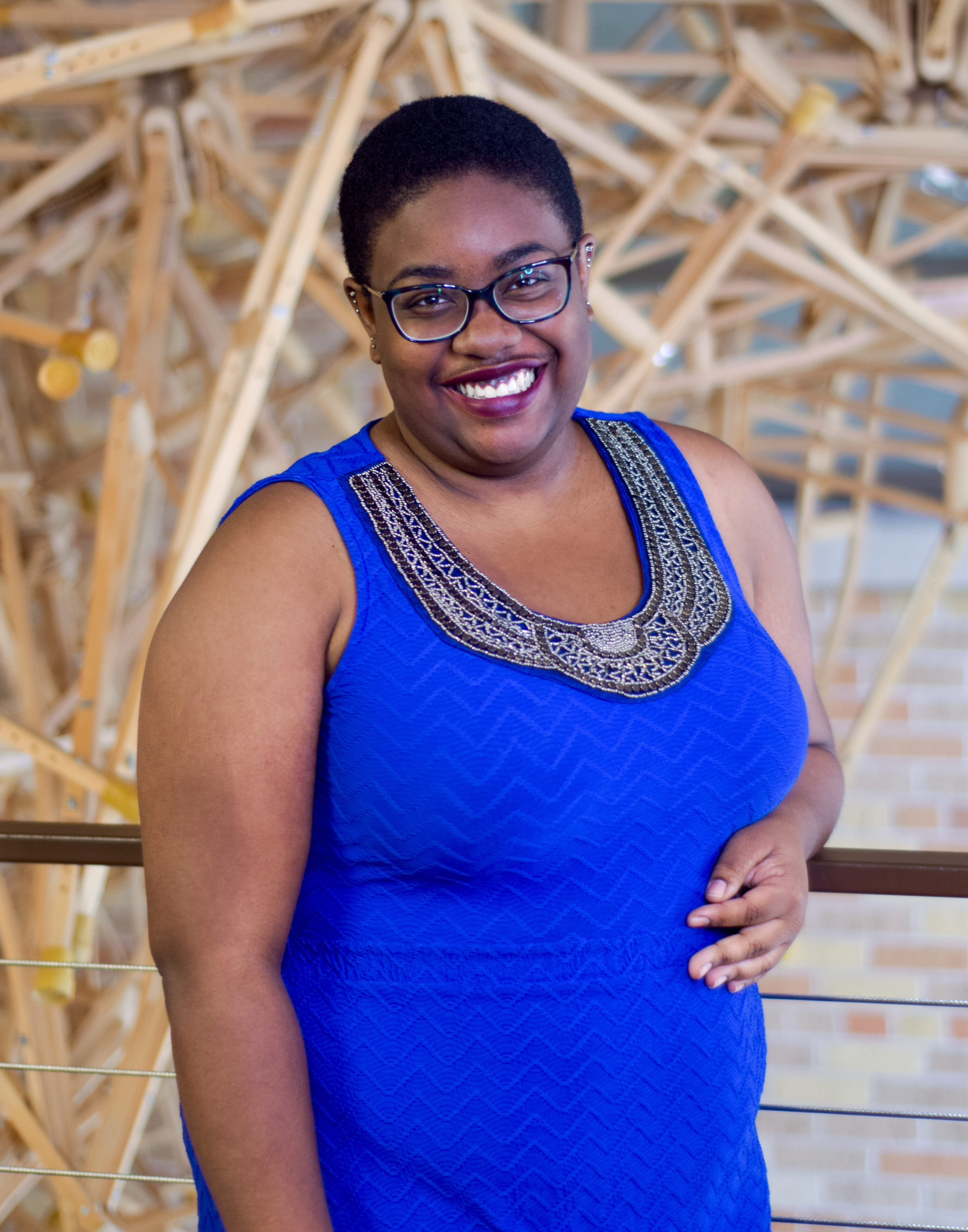Announcing the 2019 John Money Fellows
The John Money Fellowship for Scholars of Sexology was established by Dr. John Money in 2002 and is awarded annually to support the work of one or two graduate students whose research would benefit from the resources of the Kinsey Institute Collections. Fellows are also expected to contribute to the organization, preservation, and/or accessibility of Kinsey Institute collections.
Congratulations to our 2019 fellows: Alexandria Cunningham, Mark Lockwood, Anthony Silvestri, and Beans Velocci.

Alexandria Cunningham is a Ph.D. student at the University of Texas at Austin in African and African Diaspora Studies
Cunningham's research project, "The Pleasure Tapes from Juke Joints to Strip Clubs: Black Women’s Sensual Movement and Erotic Cultural Production of Black Freak Nasty Magic," is an interdisciplinary dissertation project that examines Black sexual cultures through dance, such as burlesque, striptease, and pole. As Black feminist cultural studies research, it illuminates a historical arc of Black women’s erotic cultural production, primarily through music and sensual movement, across material and digital spaces of pleasure in the United States.
Black music—blues, jazz, rhythm and blues, and hip-hop—are often the soundtrack of erotic industries, including sensual movement classes. Twentieth-century performance traditions—especially the dirty blues era (1920s to late 1950s) and burlesque striptease—anchor the dissertation’s arc to contemporary exotic dance and sexual anthem hip-hop culture. Such a turn highlights the discursive interplay between Black women’s historic and current sensual movement communities, hip-hop’s explicit, sexually narrative music, and social media representations of Black women’s erotic labor.
Cunningham's research explores Black women’s sensual movement communities, especially, burlesque and pole, to trace the ways Black women’s erotic cultural production from the early 1900s to the present day leverage various technologies, industries, soundscapes, and spiritual practices. With such a focus, this research is concerned with how the discourse of Black feminist pleasure may be further expanded by sensual movement and movement-based erotic practices. Ultimately, this research considers how Black women’s strategies of erotic self-making inspire erotic institutions and contribute to a Black feminist praxis of pleasure rooted in sensual movement.

Mark Lockwood is a PhD student in the Department of American Studies at the University of Maryland, College Park
Mark’s research focuses on black masculinity, visuality, and performance in gay pornography’s “thug porn” genre. His research project is "Black Inches: Black Masculinity, Visuality, and Performance in Thug Pornography."
In 1996, Enrique Cruz revitalized the gay porn market with Learning Latin, one of the first gay pornographic films that popularized a largely urban, Black and Latino, youth-oriented culture. Learning Latin marked the beginning of a new movement, spearheaded by Black and Latino porn actors and directors, who were disappointed with the exclusion of people of color from pornographic media industries. Responsible for producing hundreds of films, this movement – initially dubbed “Blatino porn” and then “thug porn” – became quickly appropriated by white directors who saw a revenue-generating market for representing these men as socially deviant and sexually discreet “homo-thugs” (dressed in oversized T-shirts and baggy jeans). Black porn actors were of course aware of how their representations circulated and instead performed the homo-thug as a way of re-theorizing black sexual identity and practices. In essence, these performers retooled the homo-thug image beyond the limits of the white male gaze.
Over the next few months, Mark will work with the DWoods Black Sexuality Collection to see how gay pornography utilized the homo-thug image and urban cities to showcase black men’s sexual discretions, intimacies, and vexed relationship to geography. Through visual and textual analysis of print magazines and hardcore moving-image media, he hopes to see how thug porn and the representations produced within this niche market, offer a counter-narrative to black queer sexual agency, cultural production, and quotidian black life.
Finished Project
Mapping project: Ethnic Notions: Mapping Gay Porn Across Time, 1970-2010

Anthony Silvestri is a Ph.D. student in the Media School at Indiana University
Anthony's doctoral research focuses on the archival projects of members of the post-war American avant-garde movement. In particular, he is interested in examining this topic through two collections: The Andy Warhol Time Capsules in Pittsburgh and the Kenneth Anger Mixed Media Collections at the Kinsey Institute.
He will be continuing his ongoing work on the Kenneth Anger Collections at the Institute. The experimental filmmaker began sending materials to the Institute as a paid buyer after becoming friends with Dr. Alfred Kinsey in the 1950s. Since then, Dr. Anger has amassed an expansive archive at the Kinsey Institute that includes twenty boxes of newspaper and magazine clippings spread across two decades, art donations, various books, photographs and audio-visual materials across several mediums.
With the support of the 2019 John Money Fellowship, Anthony will create a finding aid for the contents of the ephemera boxes that Dr. Anger compiled in the 2000s. Comprised of magazines that cover an array of topics ranging from interviews with the filmmaker to conservational efforts revolving around the ability of bats to save bananas, to books, experimental and pornographic DVDs, sex shop pamphlets, signs collected off Sunset Boulevard, and a photo block of a plant from New Zealand, these archival boxes often push the boundaries of what is expected to reside in the collections of an institution devoted to ‘a greater understanding of human sexuality and relationships through research, outreach, education, and historical preservation.’ Having a finding aid will not only assist future researchers scholars to understand the full scope of the organization’s collections and the vast assemblage of materials that Dr. Anger has sent in, but will also facilitate an understanding of why the experimental filmmaker believes these items to be of use to the Institute.

Beans Velocci is a Ph.D. student in History at Yale University
In their research project, "Binary Logic: Race, Expertise, and the Persistence of Uncertainty in American Sex Research," Velocci argues that rather than producing a steady march towards increasingly narrow binary sex categories, mid-nineteenth to mid-twentieth century American sex science was shot through with ambiguity. Scientists’ efforts to sort the living world by sex created more problems of taxonomy than it solved: male and female failed to hold up as discrete categories, racial hierarchies violated claims of sexual dimorphism, and scientists rarely agreed on what sex was.
By focusing on ambiguity rather than crystallization, Binary Logic combines transgender history and science and technology studies to shift the history of the production of sexual categories away from a hegemonic disciplining of difference and towards a contingent and contentious process of aspirational knowledge production that never quite achieved its goals. The dissertation opens with an examination of zoology and animal husbandry, where scientists shored up their cultural authority by identifying the “true” sex of animal specimens even as they framed non-binary sexual morphology as extraordinarily common. It subsequently journeys through eugenic perspectives on sexual ambiguity, feminist refusals of hierarchical sex difference, and visual representations of sexological data. It concludes with the development of transgender medicine, investigating how sexologists’ understanding of sexual malleability and patients’ diverse gender experiences nonetheless culminated in a treatment model that upheld binary standards. In the process, the category “transgender” came to function as a release valve for the pressures that sex science had put on sexual ontology.
Finished Project
Personal reflective statement: Standards of Care
Support Kinsey
Love is more than an emotion. It is essential to our individual and collective well-being. Your support will help the Kinsey Institute advance research and education in the science of love and give a diverse field of researchers the resources they need to make new discoveries.
Pledge your support